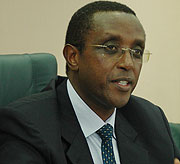A day after Parliament went into a two-months- recess, Senators have strongly refuted allegations that they don’t sufficiently address grassroots issues by reaching out to the communities that they represent.


A day after Parliament went into a two-months- recess, Senators have strongly refuted allegations that they don’t sufficiently address grassroots issues by reaching out to the communities that they represent.
In a media conference on Thursday that was aimed at showcasing achievements of the Upper House during the just-concluded second term, a concern was raised that both chambers of parliament do not approach ordinary citizens to address their issues.
"No one can meet every particular individual and discuss their particular issues all over the country,” said Senate President Dr. Vincent Biruta, explaining that 26 Senators cannot be able to meet every Rwandan at a particular time to solve a particular problem; rather issues are dealt with in a countrywide manner.
He however admitted that about 80 percent of the Senators’ time is spent in the House dealing with issues related to legislation, but was quick to add that this makes up the bottom-line of whatever is to be achieved in the country’s daily life.
During the second term that ended on August 4, the Senate discussed and endorsed 16 bills, he said.
Biruta explained that despite many hours that they spend discussing legislations, they also manage to allocate enough time to discuss reports that are compiled by various commissions basing on the outcomes of their field works.
PSP issues
One of the reports that were compiled by the Senate Commission on Political aAffairs and Good Governance exposed the wrangles within the Prosperity and Solidarity Party (PSP) that used to be headed by former Senator Stanley Safari.
Senator Joseph Karemera, head of the commission, said they found out that genocide ideology was spreading within the party, on top of ethnic divisionism and breach of laws governing political parties of the country.
"The party seemingly still suffers a great deal even after Safari fled the country. But we will continue to follow it up closely,” he said, adding that different measure have been taken to avoid creation of factions within the party.
Reports have it that recent elections to replace Safari won by Phoebe Kanyange were contested by another faction lead by one Jean Baptiste Nsanganira. Safari fled the country after being convicted by a Gacaca court for Genocide crimes.
Ends


